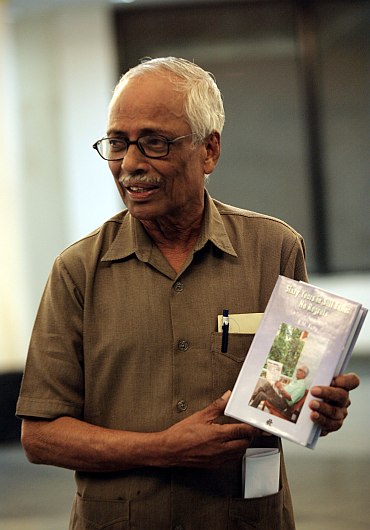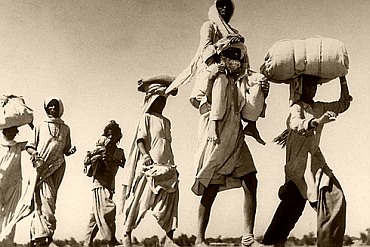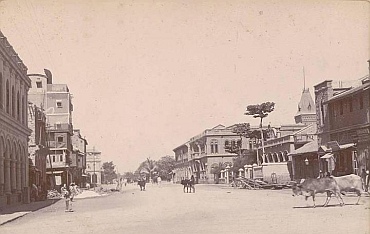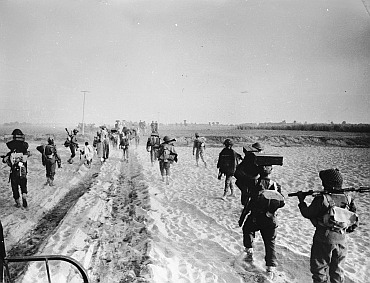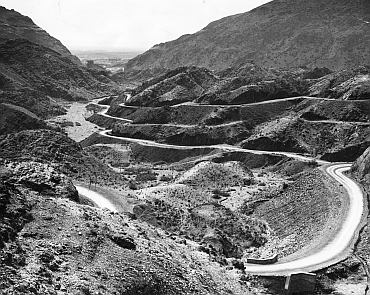 | « Back to article | Print this article |
'I never strayed from politics because I am a Malayalee'
Eighty-one-year-old B M Kutty is a Pakistani citizen from Kerala. He is a staunch communist and has been associated with political developments in Pakistan for over six decades.
He was just 19 when he left for Pakistan without informing anyone from his family. Ever since then, he has been actively involved in Pakistan left politics. He has been accused of being a foreign agent and has spent considerable time in jail.
Kutty is in Delhi for the launch of his autobiography titled Sixty years in self exile: No regrets. In this interview, Kutty tells rediff.com about his life and his association with Pakistani politics.
The octogenarian says that the so-called enmity between India and Pakistan can be solved if people would be allowed to meet each other.
Also read: Meet the Malayali Marxist living in self-exile in Pakistan
"They just need to meet and see each other's lifestyle and all the enmity will be forgotten. One small example: Pakistani people get products manufactured by Dabur in India, but instead of it being imported directly from India, it comes from Dubai."
If that channel can be direct between the two neighbors, imagine the cooperation that can be achieved," Kutty says before the start of the interview.
Click NEXT to read further...
'I have written what I witnessed since my migration'
You have led an active political life, admittedly in exile that spans over six decades. Yet the memoir you have written has been subtitled as a 'political auto-biography' and not just 'auto-biography.' Why is that so?
I have written about my birth in Tirur, Kerala, my upbringing and what I went through in my family. Yes, I have written about myself, but my book essentially is about the political developments in Pakistan, which I witnessed.
I am there, and it is my story, but I am just a passing show. What I have tried to do is chronicle the important political developments in Pakistan I witnessed since 1949 after my migration. My whole life has been in (Pakistani) politics.
So, from the very beginning till the end, you will see more of Pakistan politics and less of me. That is why I have called it a political autobiography. An autobiography essentially describes the 'me'. What I have done in my life is because of a combination of people and political conditions in the state.
When did you first conceive the idea of writing this book?
Around 2006. I had brought my grand-children to Kerala, and that is when I thought that I should write a book on my life. So many friends of mine in Lahore and Karachi have been telling me for a long time that I should write about my experiences.
I was one of the rarest individuals in Pakistan who closely viewed political happenings and developments there.
The best part was that I have no stakes in any of these developments, so I could speak about all of them without political interferences and losses.
I have been a political activist all my life, so I didn't have to beat around the bush, I could tell the truth. If I was a political leader, probably I could not have told the truth.
I A Rehman (Pakistani peace and human-rights advocate), who is the top most intellectual in Pakistan, had been telling me to write the book. In fact, when my book was released, he left all pressing engagements to be in Karachi for the book launch.
Click NEXT to read further...
'I have no idea why I ran away from college'
Tell us about your life in Kerala and the circumstances under which you migrated to Pakistan.
Those days, in Malabar, Muslims were not so educated. Most of the families didn't send their children to school after the Mappila rebellion in 1921, Martial Law, etc.
I was born in one such family. But, my father (Biyyathil Kunhalavi Haji), who was semi-literate, had the good sense to send me to school and subsequently to college in Madras. I ran away while in college. I still don't have any concrete reason as to why I left!
In my college in Madras (Mohammedan College) I was studying in an alien atmosphere. The subjects I took were not even to my liking. They were forced on me by my father, who had his own perception of studies and future.
Imagine: I had physics, chemistry and natural science; I don't even remember what natural science was! So, I just decided to go to Pakistan. I sent a telegram to my father that I was coming to Kerala, but took off to Bombay instead.
There, I stayed with a neighbor friend for a few days. He was a great admirer of my father and gave me the option of continuing my education. From there, without telling him, I left for Karachi.
Can you describe your early life in Karachi in brief ? Were there other Malayalees like yourself there?
As a matter of fact, when I reached Karachi, I was surprised to see many Malabaris there. These were victims of the British Martial laws against the Mapilla rebellion. They had come here in the 1920s and were one of the most flourishing communities in Karachi.
They came here to escape the British Martial laws and bought a kettle and some cups and started supplying tea to various offices. By the time I reached there, they were flourishing.
There were many little restaurants named Malabar restaurant or Kerala cafe, etc. Some of the leading restaurants were owned by Muslims from Kerala.
Click NEXT to read further...
'You could take a train to Karachi from Mumbai back then'
What were the formalities at the time you migrated to reach Pakistan? Were visas and other documents required?
No, no. It was a very simple process. You could take a train ticket to Karachi from Mumbai. Passports and visas came in 1953.
When did you first contact your father and family to tell them that you have migrated to Pakistan?
When I reached Karachi, as I told you, there were a lot of Malayalee Muslims there. It was actually they who informed my father. My father was understandably furious. He had invested a lot in me mentally.
He had reason to be angry as I had gone to Bombay after telling him I was coming home. From there I proceeded further north without telling anyone. I was his eldest son after all! He was frustrated.
And probably because of my migration, he did not educate my younger brother. Things became normal after I got married and sent photographs of my wife Birjis to my mother. My mother fell in love with my wife. That changed everything.
Are there still a large number of Malayalees in Pakistan?
Not many are left. Actually, following the 1965 India-Pakistan war, they started considering if they really wanted to be a part of Pakistan. After the 1971 war, most of them left. Most of them had their wives back in Kerala and once a year, during Ramadan, they would go back to be with their families.
They were there just for working. Following the 1971 India-Pakistan war, because of the political developments, they could not go to Kerala. Instead, they went to Dubai and other Gulf countries, from where they obtained Indian passports.
Click NEXT to read further...
'I wanted to reach right up to Khyber Pass'
Tell us about the starting of your political career in Pakistan.
I did not want to stay in Karachi, as my destination was Lahore. I stayed here for about two months, before leaving for Lahore. I always found Lahore fascinating as I had heard stories about Jehangir and Nur Jehan, Anarkali etc. I wanted to reach right up to Khyber Pass.
I started my political career in Lahore. I joined the Leftist political party. From then till now, I have been in the Pakistani left politics.I never strayed away from left politics, probably because I am a Malayalee!
Your wife is someone who has stood by you throughout your political career, the time you spent in jail, etc. Tell us a little about her.
My wife is from an aristocratic family in Uttar Pradesh. Her family had migrated to Pakistan from Delhi. She was very beautiful. I often say that she fell in love with me and I destroyed her life.
She was the niece of my chief accountant. She stayed with me despite the fact that I was just a political worker, while her relatives were in the top rung of Pakistani bureaucracy. While her family stayed in bungalows and had expensive cars, she stayed with me in my rented accommodation.
She always stood by me and thus she is one of the four women I have dedicated this book to.
Click NEXT to read further...
'Kashmir is not an internal conflict'
You were in jail for quite some time. What were the circumstances that led to your arrest?
I was with the Awami League when I went to Kerala with my wife in 1958. This was the time that President Iskander Mirza proclaimed Martial Law. I told my office that my mother was seriously ill and took off. (by then, political parties and activities were banned and political activists were being arrested in large numbers.)
In March, 1959, I received letters from Pakistan which suggested that things were back to normal. I reached Pakistan and found that there was still trouble. Back in Lahore, I was followed for about a month. I received a telegram a month later from my head office about a meeting in Karachi. I reached Karachi, where I was arrested.
I learnt later that my head office had sent me no such telegram.
I spent about six months in solitary confinement locked up in a woman's lockup. There was not even a single woman there, had there been one, things would not have been as bleak (chuckles). I had no contact with my wife or children for six months. I was arrested for being an agent for a foreign power.
You have been actively involved in the Baluch conflict in Pakistan. Are there any similarities that can be drawn between India's northeast or Kashmir conflict and the Baluch conflict?
I don't think so. They are all different. Maybe in one respect - your northeast and our Baluch conflicts are internal affairs of both countries. Kashmir, however, is not an internal conflict.
It is an international issue. It is between two independent and sovereign countries -- India and Pakistan -- and the people of Kashmir. So in that sense, the Kashmir conflict is totally different.
